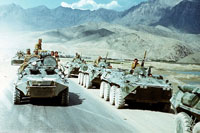No One Knows Why USSR Started War in Afghanistan
On December 25, 2009 Russia marked 30 years since the beginning of the Soviet military campaign in Afghanistan. Soviet troops crossed the border between the USSR and Afghanistan on December 25, 1979 at about 3:00 p.m. Moscow time. The event marked the beginning of the large-scale military operation the goal of which was a mystery to all. Neither the members of the Communist Party administration, nor Soviet marshals knew exactly why the USSR had to enter the territory of Afghanistan, The Rossiiskaya Gazeta newspaper wrote.

The Soviet Union lost 15,051 people in total during the years of the Afghan war. Over 250 soldiers and officers are still considered missing. One day of the war supposedly cost the USSR 5 billion rubles, although there is no official information to confirm that. American experts calculated that maintaining only one US soldier in Afghanistan nowadays costs the States $1 million a year.
Many experts say nowadays that the West failed to learn the USSR’s lessons in the Afghan war, claiming that coalition troops may repeat the fate of the Soviet troops in the war-torn country.
The Soviet leaders were uncertain of their decision to send troops to Afghanistan. There was only one official document prepared for that, handwritten and signed by then-leader Konstantin Chernenko. A number of high-ranking politicians in the USSR stood up against the military campaign, and all of them lost their positions.
As for the then-administration of Afghanistan that begged Moscow for military support, the nation’s leader Hafizullah Amin was killed on December 27 during the siege of his residence. Many officials of his team were jailed for years afterwards.
The West was celebrating a small victory: the USSR found itself in a very serious situation, and there was no way out of it.
The USA had assigned nearly $1.5 billion to support Afghan Mujahideens by the middle of the 1980s. Saudi Arabia and other countries provided similar amounts of money. One should bear in mind the fact that the price of the US dollar was a lot higher back then than it is now.
Never before had a rebel movement enjoyed such extensive support from other countries. It was not only a large-scale operation against the Soviet troops in Afghanistan – it was a global war to weaken and destroy the Soviet Union.
It is worthy of note that Leonid Brezhnev and his associates were strongly against the military support to the Afghan regime. Many top politicians of the USSR said several months before the start of the campaign that the Soviet Union would not be involved in the war.
To understand the reason why, one should recollect peculiarities of that time. The Soviet administration was obsessed with phobias of class struggle, Reagan pronounced the USSR “the empire of evil”, and the relations between the USSR and the USA were at the peak of tension. Moscow and Washington were about to pull their triggers.
The States lost a strategically important territory – Iran – after radical Islamists came to power in the country. Afghanistan was sending telegrams to the USSR saying that governmental troops could not cope with Mujahideens alone. Soviet special services concluded that the United States could easily take Afghanistan under control and deploy long-range missiles very close to Soviet borders.
Even now, 30 years after, it is not clear who in the Soviet administration eventually decided to launch the military operation in Afghanistan.
Strange as it may seem, the USA now repeats the USSR’s mistakes in Afghanistan. President Obama’s recent decision to send 30,000 more servicemen to the war-torn nation equalizes the USSR’s restricted contingent and ISAF forces. Afghan President Hamid Karzai, who does not control even a third of his nation, is concerned about the USA’s intention to start withdrawing the troops in 2011.
The more foreign troops find themselves in Afghanistan, the more Pashtuns, Tajiks and locals of other nations will grab their guns to show fierce resistance to them. The Britons learned this lesson in the 19th century, the Russians – in the 20th, and now it is turn for the Americans to come to the same conclusion.
A military operation in Afghanistan does not lead to anything good. The British Empire collapsed, the Soviet Union broke up, the USA spent over $300 billion to destroy the mythical terrorists, but received nearly 1,000 caskets back. One should bear in mind the fact that the majority of Afghans are completely indifferent to ideas of communism, and values of Western democracy. What unites them is their rejection to any type of foreign interference.
Rossiiskaya Gazeta
Subscribe to Pravda.Ru Telegram channel, Facebook, RSS!





